%BD%95让被病毒恶意隐藏的文件夹重见天日
三年级上册语文《盘古开天地》生字组词人教版
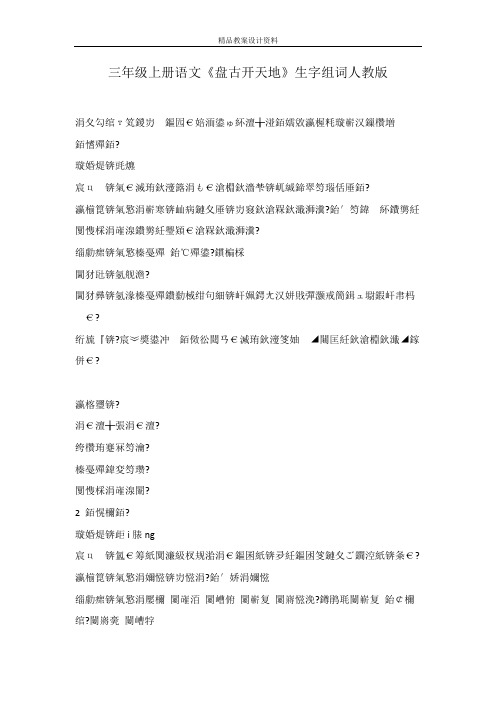
三年级上册语文《盘古开天地》生字组词人教版涓夊勾绾т銆愭殫銆?璇婚煶锛毭爊宸ц?瀛椾箟锛氣憼涓嶄寒锛屾病鏈夊厜锛岃窡鈥滄槑鈥濈浉瀵?闅愯棌涓嶉湶鐨勶紝璺熲€滄槑鈥濈浉瀵?缁勮瘝锛氣憼榛戞殫鈶℃殫鍙?鏆楄棌閫犲瓧锛氬舰澹?閫犲彞锛氬湪榛戞殫鐨勬棫绀句細锛屽姵鍔ㄤ汉姘戝彈灏戒簡鍓ュ墛鍜屽帇杩?绗旈『锛?併€?瀛楁瓕锛?涓€澶╁張涓€澶?绔欑珛蹇冧笉瀹?榛戞殫鍏変笉瓒?闅愯棌涓嶉湶闈?2 銆愰檷銆?璇婚煶锛歫i脿ng宸ц? 瀛椾箟锛氣憼涓嬭惤锛岃惤涓?鈶′娇涓嬭惤缁勮瘝锛氣憼涓嬮檷闄嶉洦闄嶆俯闄嶄复闄嶈惤浼?鐏鹃毦闄嶄复鈶¢檷绾?闄嶈亴闄嶆牸閫犲瓧锛氫細鎰忔硶? 绗旈『锛?宸︾獎鍙冲?ji脿ng锛?鎷掍笉鎶曢檷锛坸i谩ng锛?璺充紴闄嶏紙ji脿ng锛夎惤绋冲綋涓嬮檷锛坖i脿ng锛?3 銆愪笀銆?璇婚煶锛歾h脿ng宸ц?瀛椾箟锛氣憼甯傚埗闀垮害鍗曚綅锛?涓堟槸10灏猴紝绾﹀悎3.33锛堢背锛?鈶℃祴閲忛暱搴︺€侀潰绉?缁勮瘝锛氫笀閲?涓堝湴娓呬笀閫犲瓧锛氫細鎰??绗旈『锛?鎾囧厛鍚戜笅鍐嶅悜宸︿几锛屾嵑鑸掑睍锛屼笌鎾囩浉瀵广€?瀛楁瓕锛?澶т笀澶?鍘绘墦浠?璐熶簡浼?鎷勬嫄鏉?4 銆愯偄銆?璇婚煶锛歾h墨宸ц?瀛椾箟锛氫汉鐨勮兂鑶?鑵匡紝涔熸寚鏌愪簺鍔ㄧ墿鐨勮吙缁勮瘝锛氳偄浣?鍥涜偄鍚庤偄涓婅偄涓嬭偄鑲㈠娍鑲㈤殰閫犲瓧锛氬舰澹版硶?绗旈『锛?銆?5 銆愯倢銆?璇婚煶锛歫墨宸ц?寸粍鎴愶紝鍏锋湁鏀剁缉鐗规€?缁勮瘝锛氳倢鑲?鑲屼綋鑲岀悊閫犲瓧锛氬舰澹版硶?绗旈『锛???鏈ㄥご鍋氭満鏉??鏈堜笅璧忚倢鑲?6 銆愯偆銆?璇婚煶锛歠奴宸ц?瀛椾箟锛氱毊鑲わ紝浜轰綋琛ㄩ潰鐨勭毊銆傘€愬柣銆戣〃闈㈢殑锛屾祬钖勭殑缁勮瘝锛氳偆鑹?鑲岃偆鍒囪偆涔嬬棝浣撴棤瀹岃偆銆愬柣銆戣偆娴?鑲ゆ硾閫犲瓧锛氬舰澹版硶閫犲彞锛氭垜瀵规垙鏇茬殑浜嗚В寰堣偆娴呫€?绗旈『锛??7 銆愯窘銆?璇婚煶锛歭i谩o宸ц?瀛椾箟锛氣憼杩?9071125骞?缁勮瘝锛氣憼杈介様杈借繙骞呭憳杈介様閫犲瓧锛氬舰澹版硶,鐗╀骇涓板瘜銆?绗旈『锛?鈥滀簡鈥濆啓楗辨弧锛涒€滆径鈥濇嵑绗斿厛鍙栨í鍔胯浆骞虫嵑銆?瀛楁瓕锛氬北宸濊窘闃?鐤楁晥涓嶉敊8 銆愰様銆?璇婚煶锛歬u貌宸ц?瀛椾箟锛氣憼闈㈢Н??缁勮瘝锛氣憼瀹介様杈介様骞块様鈶¢様姘?鎽嗛様闃斾汉閫犲瓧锛氬舰澹版硶?绗旈『锛?у噾锛屽ぇ灏忛€備腑銆?浜轰滑蹇欓棯韬?閬囦簨寮€鍙i棶闃?9 ?璇婚煶锛歺u猫宸ц?瀛椾箟锛氣憼琛€娑诧紝浜哄拰楂樼瓑鍔ㄧ墿浣撳唴鐨勭孩鑹叉恫浣?鈶℃寚鍒缁勮瘝锛氣憼琛€娑?琛€鍘?琛€娉??琛€姘旀柟鍒?閫犲瓧锛氫細鎰?屽悜绌峰北鎭舵按鍙戣捣浜嗘湁鍔涚殑杩涙敾銆?绗旈『锛?鎾囧湪绔栦腑绾夸笂璧风瑪锛屸€滅毧鈥濅袱渚у€?瀛楁瓕锛?娴佷竴鐐圭偣琛€锛坸i臎锛?鏈変竴鑵旂儹琛€锛坸u猫锛?浜嬪疄琛€锛坸i臎锛夋穻娣?琛€锛坸u猫锛夊€轰笉蹇樺嵈10 銆愭恫銆?璇婚煶锛歽猫宸ц?剁殑鐗╄川缁勮瘝锛氭恫浣?琛€娑?婧舵恫娑叉櫠娑叉€?姹佹恫閫犲瓧锛氬舰澹版硶?绗旈『锛?鈥滀夯鈥濆啓鍦ㄢ€滀籂鈥濈殑涓嬮潰锛屾嵑瑕佷几灞曘€?11 銆愭粙銆?璇婚煶锛歾墨宸ц),璧板埌娌?姘?杈圭湅涓€鐪嬨€?瀛椾箟锛氣憼鐩婏紝澧炵泭锛屽姞澶?鈶$敓鍑猴紝闀?鈶㈠柗灏?缁勮瘝锛氣憼婊嬫鼎婊嬬泭婊嬭ˉ鈶℃粙闀?婊嬭娊婊嬩簨婊嬭敁鈶?鏂?婊嬫按閫犲瓧锛氬舰澹版硶閫犲彞锛氶檮杩戠殑婀栨按婊嬫鼎鐫€鐗у満鐨勯潚鑽夈€?绗旈『锛?у噾銆?瀛楁瓕锛氫汉蹇冩厛鍠?姘磋崏婊嬭敁鍙e悆绯嶇矐12 銆愭鼎銆?璇婚煶锛歳霉n宸ц?瀛椾箟锛氣憼缁嗚吇鍏夋粦鈶″姞娌规垨姘达紝浣夸笉骞叉灟鈶㈡箍锛屼笉骞叉灟鐝犲渾鐜夋鼎鈶℃鼎鑲?鈶㈡鼎娉?婀挎鼎閫犲瓧锛氬舰澹?閫犲彞锛氶洦鍚庤嵎鑺辨樉寰楁洿鍔犳鼎娉藉彲鐖变簡銆?绗旈『锛?т竴浜涳紝鈥滅帇鈥濈獎鐭€?瀛楁瓕锛?闂板湪姘磋竟婊嬫鼎甯歌繛闂村湪姘磋竟13 銆愬垱銆?璇婚煶锛歝hu脿ng宸ц?瀛椾箟锛氬紑濮嬶紝寮€濮嬪仛缁勮瘝锛氬垱閫?鍒涘姙棣栧垱鍒涗妇鍒涘垔鍒涘缓鍒涗紭鍒涚珛鍒涜鍒涗笟閫犲瓧锛氬舰澹版硶?绗旈『锛??瀛楁瓕锛氱敤鍒€寮€鍒?鑽夊湴鑻嶈尗鐢ㄦ墜鏉ユ姠蹇冧腑鎮叉€?14 銆愰€犮€?璇婚煶锛歾脿o宸ц?瀛椾箟锛氣憼鍒朵綔锛屽仛鈶℃垚灏?鈶㈠埌锛屽幓鈶e煿鍏?缁勮瘝锛氣憼鍒涢€?閫犳灄鐧诲嘲閫犳瀬鈶f繁閫??閫犲瓧锛氬舰澹?閫犲彞锛氬姵鍔ㄤ汉姘戞槸鍘嗗彶鐨勫垱閫犺€呫€?绗旈『锛?€?瀛楁瓕锛?姘村娍娴╁ぇ闈炲緱闈犲哺鐨撴湀褰撶┖。
六年级下册语文《鲁宾逊漂流记》多音字汇总人教版
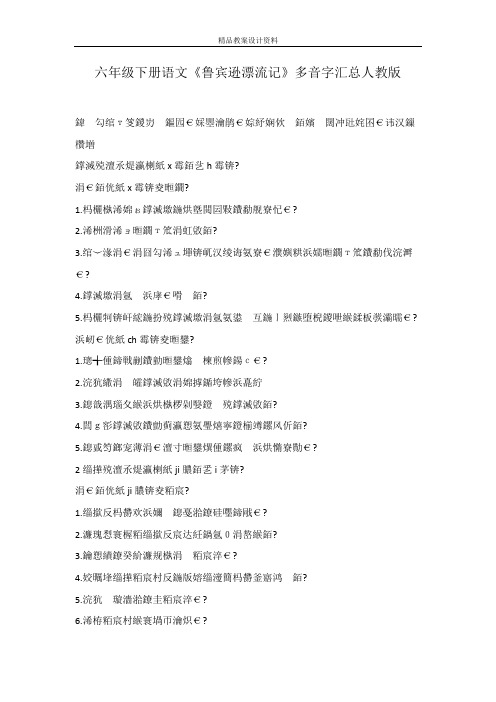
六年级下册语文《鲁宾逊漂流记》多音字汇总人教版т欑増鐣滅殑澶氶煶瀛楋紙x霉銆乧h霉锛?涓€銆侊紙x霉锛夌暅鐗?1.杩欐槸浠婂ぉ鐣滅墽鍦烘墍閲囩敤鐨勫舰寮忋€?2.浠栦滑浠ョ暅鐗т笟涓虹敓銆?3.绾﹀湪涓€涓囧勾浠ュ墠锛屼汉绫诲氨寮€濮嬩粠浜嬬暅鐗т笟鐨勫伐浣溿€?4.?5.? 浜屻€侊紙ch霉锛夌暅鐢?1.с€?2.3.?4.閭g彮鐣滅敓鐨勯蓟瀛愬氨璺熺寧鐙椾竴鏍风伒銆?5.?2缁撶殑澶氶煶瀛楋紙ji膿銆乯i茅锛?涓€銆侊紙ji膿锛夌粨宸?1.?2.濂瑰悡寰楃粨缁撳反宸达紝鍋氬0涓嶅緱銆?3.?4.?5.?6.浠栫粨宸村緱寰堝帀瀹炽€?浜屻€侊紙ji茅锛夌粨浼?1.浠栦滑涓変笁涓や袱缁撲即鍓嶅線銆?2.?3.?4.鎴戜滑缁忓父缁撲即鍘绘梾娓搞€?5.涓€鍒板ぉ榛戯紝濂规€绘槸鎵惧ス鍚屽幓鐨勪汉锛屽拰濂逛滑缁撲即鑰岃?3澶勭殑澶氶煶瀛楋紙ch霉銆乧h菙锛?涓€銆侊紙ch霉锛変綇澶?1.浠栦滑鐨勪綇澶勫彧鏈変竴鎴蜂箣闅斻€?2.浠栦滑鍦ㄦ潙瀛愰噷鎵惧埌浜嗕綇澶勩€?3.?4.?5.?浜屻€侊紙ch?1.?2.?3.ф壒淇′欢銆?4.?5.?涓夈€侊紙ch?1.?2.?3.?4.?5.?4灏界殑澶氶煶瀛楋紙j菒n銆乯矛n锛?涓€銆侊紙j菒n锛夊敖绠?1.?2.濂瑰敖绠℃湁鐥咃紝浣嗕粛寰堝揩涔愩€?3.?4.?5.?浜屻€侊紙j矛n锛夊敖澶?1.?2.鏈€闅捐繃鐨勬棩瀛愪篃鏈夊敖澶淬€?3.浠栫煡閬撹嚜宸卞凡鍒颁簡浜虹敓灏藉ご銆?4.?5.?。
三年级语文上册词语表整理(四字词语)
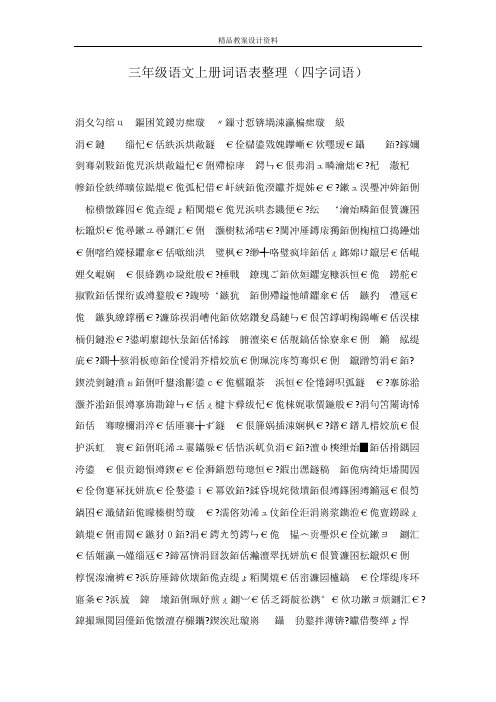
三年级语文上册词语表整理(四字词语)涓夊勾绾ц?鎵嬭??鏉ュ洖璺冲姩銆侀??闃冲厜鏄庡獨銆侀椈楦¤捣鑸炪?缈╃咯璧疯垶銆佸ぇ鎯婂け鑹层€佸崐?掓斁銆佸惈绗戜竴鐜般€??濂旀祦涓嶆伅銆佽姳鑽夋爲鏈ㄣ€佷笘鐣岄椈鍚嶃€佸洖棣栭仴鏈涖€?庛€???搴旀湁灏芥湁銆佷竴搴斾勘鍏ㄣ€佸ぇ楗卞彛绂忋€佹梾娓歌儨鍦般€?涓句笘闂诲悕?鐠€鐠ㄦ棤姣斻€佷?澶ф樉绁炲▉銆佸搰鍝囩?€佺伆蹇冧抚姘斻€佺嫯鍙i€冪敓銆?鍒昏垷姹傚墤銆佷竴鎽囦竴鏅冦€佷笉?濡傛効浠ュ伩銆佺洰涓嶈浆鐫涖€佹亶鐒跺ぇ鎮熴€侀甫闆€鏃犲0銆?€佸嫟瀛﹁嫤缁冦€?椁愰湶瀹裤€?寤夈€??鍏撮珮閲囩儓銆佹憞澶存檭鑴??钀借嫳缂ょ悍婊″ぉ椋炶垶缇よ姵鍚愯壋涓囩传鍗冪孩濮圭传瀚g孩鍏夊僵澶虹洰灞傚肠鍙犵繝鑻嶇繝娆叉淮宕囧北宄诲箔杩炵坏涓嶆柇杩炵坏璧蜂紡鍠疯杽娆插嚭澶曢槼瑗夸笅鐨撴湀褰撶┖涓囬噷鏃犱簯婀涜摑娣辫繙姘村钩濡傞暅娓呮緢瑙佸簳娓呮柊鐢滄鼎閮侀儊钁辫懕鍐板涓€鏈涙棤闄?鐔婄唺澶х伀浜虹墿鎯呮劅锛?瀛よ嫤浼朵粌楗ュ瘨浜よ揩瀛ゅ崟澶辩兢鍨傚ご涓ф皵璇氬績璇氭剰壊鎭嶇劧澶ф偀缇炴劎涓囧垎璇氬績璇氭剰灏忓績缈肩考娲ユ触鏈夊懗鎭嬫亱涓嶈垗澶ф儕灏忔€?姘旂劙鍤e紶浜虹墿鍔ㄤ綔锛?娌夐粯涓€鍔ㄤ笉鍔?涓嶇害鑰屽悓缈╃咯璧疯垶闀块€旇穻娑?鑵句簯椹鹃浘寮傚彛鍚屽0寮犲彛缁撹垖璧炰笉缁濆彛鐖变笉閲婃墜浜ゅ彛绉拌禐鐥涙敼鍓嶉潪鍗氳瀛滃瓬涓嶅€?瀛﹁€屼笉鍘?鍧氭寔涓嶆噲涓氱簿浜庡嫟涓撳績鑷村織閿茶€屼笉鑸?鑴氳笍瀹炲湴浜虹墿鑳藉姏锛?濡欑瑪鐢熻姳鐢婚緳鐐圭潧闄嶉緳浼忚檸鍚勬樉绁為€?闂诲悕閬愯咯婊旀粩涓嶇粷瀵撹█閬撶悊锛?浜$緤琛ョ墷鍗楄緯鍖楄緳鎯婂紦涔嬮笩涓€涓句袱寰?鍙楃泭鏃犵┓?簡鐒?澶ф潗灏忕敤у仛涓夐暱涓ょ煭鐧惧彂鐧句腑鐧炬褰㈡€佹牱瀛愶細灏忓阀鐜茬彂鑻ラ殣鑻ョ幇鏍╂牘濡傜敓鎯熷鏁伴噺锛?鎴愬崈涓婁竾鐞崇悈婊$洰搴旀湁灏芥湁浜旀箹鍥涙捣鍙ゅ線浠婃潵婧愭簮涓嶆柇闆堕浂鏄熸槦缁撶粨瀹炲疄鎯呭喌锛?鎸佺画涓嶆柇杩炵坏涓嶇粷绌峰洶娼﹀€?娓镐汉濡傜粐浜哄北浜烘捣?鍘嗗巻鍦ㄧ洰闈㈤潰淇卞埌鍗佸叏鍗佺編鍏村叴鍚戣崳钂歌捀鏃ヤ笂褰撳ご涓€妫?涓撳績鑷村織?鏈涘瓙鎴愰緳鏉ラ緳鍘昏剦濡傝檸娣荤考璋冭檸绂诲北楠戣檸闅句笅鐓х尗鐢昏檸澶╅┈琛岀┖姹楅┈鍔熷姵鑰侀┈璇嗛€?鐗涘垁灏忚瘯鍛嗚嫢鏈ㄩ浮鑳嗗皬濡傞紶鐢婚緳鐐圭潧闄嶉緳浼忚檸鎯婂紦涔嬮笩。
小学三年级语文上册全册成语汇总
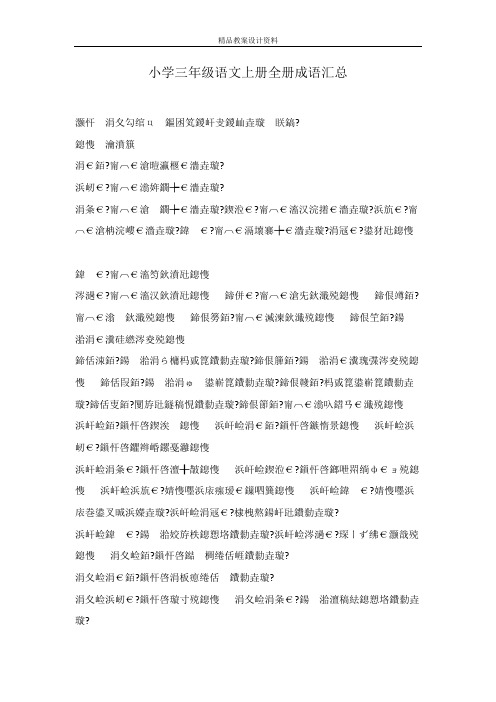
小学三年级语文上册全册成语汇总ц?涓€銆?甯︹€滄暟瀛椻€濇垚璇?浜屻€?甯︹€滃姩鐗┾€濇垚璇?涓夈€??鍥涖€?甯︹€滀汉浣撯€濇垚璇?浜斻€?甯︹€滄柟浣嶁€濇垚璇??甯︹€滆壊褰┾€濇垚璇?涓冦€?鍙犲瓧鎴愯?涔濄€?鍗併€?鍗佷竴銆?鍗佷簩銆?鍗佷笁銆?鍗佸洓銆??鍗佷簲銆?鍗佸叚銆??鍗佷竷銆?杩戜箟鍙嶄箟鐨勬垚璇?鍗佸叓銆?闅斿瓧鐩稿悓鐨勬垚璇?鍗佷節銆?浜屽崄銆?浜屽崄涓€銆?浜屽崄浜屻€?浜屽崄涓夈€?浜屽崄鍥涖€?鎻忓啓鎯呭喌绱ф€ョ殑鎴浜屽崄浜斻€??婧愯嚜浜庡巻鍙叉晠浜嬫垚璇?浜屽崄涓冦€?棣栧熬鍚屽瓧鐨勬垚璇???浜屽崄涔濄€?琛ㄧず绋€灏戠殑涓夊崄銆??涓夊崄涓€銆??涓夊崄浜屻€?涓夊崄涓夈€?璇?涓夊崄鍥涖€?涓€銆?鏁?瀛?鎴?璇?涓€鍞变竴鍜?涓€鍛肩櫨搴?涓€骞蹭簩鍑€涓€涓句袱寰?涓€钀藉崈涓?涓€妯′竴鏍?涓€鏆村崄瀵?涓€蹇冧竴鎰?涓€璐ユ秱鍦??涓€鑷備箣鍔?涓€灏樹笉鏌?涓??涓€鍝勮€屾暎涓€濡傛棦寰€涓€涓濅笉鑻??涓€绛硅帿灞曚竴瑙﹀嵆鍙?涓€鍒€涓ゆ柇涓€鎶€涔嬮暱涓€韫朵笉鎸?涓€鍔虫案閫镐竴楦f儕浜轰皻瀛?涓€鐩告儏鎰?鐣ヨ儨涓€绛逛袱璐ヤ勘浼?涓よ檸鐩告枟涓ら潰涓夊垁呭簮涓変护浜旂敵涓夌敓鏈夊垢涓夊績浜屾剰╂檼缃?鍥涢潰妤氭瓕鍥涢€氬叓杈?ǔ鍗辨満鍥涗紡鍥涙捣鍗囧钩浜斿僵缂ょ悍浜斿厜鍗佽壊浜旀箹鍥涙捣浜旇浜旈浄杞伴《涓冮涓冪獚鐢熺儫??涔濈墰涓€姣?涔濈墰浜岃檸涔嬪姏鍗佹嬁涔濈ǔ鍗佸勾瀵掔獥鍗佸叏鍗佺編?鍗佹寚杩炲績鍗佸啲鑵婃湀绁炴皵鍗佽冻鐧炬棤绂佸繉鐧惧窛褰掓捣鐧惧彂鐧句腑鐧惧簾淇卞叴鐧炬劅浜ら泦鐧捐姳榻愭斁鐧惧彛闅捐京鐧剧偧鎴愰挗鐧惧勾涓嶉亣鐧惧勾澶ц鎴樼櫨鑳滅?鐧惧昂绔垮ご锛屾洿杩涗竴姝??鍗冨彉涓囧寲鍗冨樊涓囧埆鍗冮敜鐧剧偧鍗冨懠涓囧敜鍗冨啗涓囬┈鍗冮挧涓€鍙戝崈閲岃竣杩㈠崈闂ㄤ竾鎴峰崈闅句竾闄╁崈绡囦竴寰嬪崈鍗冧竾涓囧崈绉嬩竾浠e崈灞变竾姘村崈涓濅竾缂曞崈澶翠竾缁???浜屻€?鍔?鐗?鍚嶇О?榧犺倸楦¤偁榧犵獌鐙楃洍鎶曢紶蹇屽櫒鎶卞ご榧犵獪鐛愬ご榧犵洰鑳嗗皬濡傞紶銆愮墰銆戠墰楝艰泧绁?鐗涘垁灏忚瘯鐗涢紟鐑归浮姹楃墰鍏呮爧瀵圭墰寮圭惔涔濈墰涓€姣?姘斿.濡傜墰鐗涙瘺缁嗛洦娉ョ墰鍏ユ捣銆愯檸銆戣檸瑙嗙湀鐪?铏庡彛浣欑敓铏庡ご铏庤剳铏庤儗鐔婅叞铏庡ご铔囧熬铏庤惤骞抽槼铏庣┐榫欐江鏀捐檸褰掑北璋堣檸鑹插彉濡傝檸娣荤考楠戣檸闅句笅涓鸿檸浣滀讥涓庤檸璋嬬毊钘忛緳鍗ц檸鐙愬亣铏庡▉缇婂叆铏庡彛鐙煎悶铏庡捊榫欒榫欏悷铏庡暩榫欎簤铏庢枟榫欑洏铏庤笧榫欒吘铏庤穬鐢熼緳娲昏檸闄嶉緳浼忚檸銆愬厰銆戝厰姝荤嫄鎮?鐙″厰涓夌獰楦熼瀹堟牚寰呭厰銆愰緳銆戦緳鑵捐檸璺?榫欏嚖鍛堢ゥ鐢婚緳鐐圭潧鏉ラ緳鍘昏剦鏀€榫欓檮鍑?鏈涘瓙鎴愰緳浜轰腑涔嬮緳鍙跺叕濂介緳闄嶉緳浼忚檸鑰佹€侀緳閽?绗旇蛋榫欒泧榫欐江铏庣┐銆愯泧銆戣泧铦庡績鑲?鐢昏泧娣昏冻鎯婅泧鍏ヨ崏榫欒泧娣锋潅鎵撹崏鎯婅泧铏氫笌濮旇泧绗旇蛋榫欒泧鏄ヨ殦绉嬭泧銆愰┈銆戦┈鍒版垚鍔?潻瑁瑰案??涓囬┈榻愬枒钩宸?澶╅┈琛岀┖璧伴┈鐪嬭姳淇¢┈鐢辩及涓囬┈濂旇吘鍗曟灙鍖归┈鎷涘叺涔伴┈浜轰归┈蹇冪尶鎰忛┈鍗冨啗涓囬┈棣欒溅瀹濋┈鎸囬箍涓洪┈瀹崇兢涔嬮┈鍘夊叺绉i┈濉炵縼澶遍┈鐩蹭汉鐬庨┈鑴卞兊涔嬮┈閲戞垐閾侀┈銆愮緤銆戠緤璐ㄨ檸鐨?缇婅偁灏忛亾缇婂叆铏庡彛浜$緤琛ョ墷铏庡叆缇婄兢椤烘墜鐗电緤銆愮尨銆戠尨骞撮┈鏈?娌愮尨鑰屽啝灏栧槾鐚磋叜鏉€楦″悡鐚?鏉€楦″剢鐚?銆愰浮銆戦浮姣涜挏鐨?楦¢福鐙楃洍楦¢楦$姮涓嶅畞楦$姮涓嶇暀楦$姮鍗囧ぉ闂婚浮璧疯垶鏉€楦″悡鐚?鏉€楦″彇鍗?鍋烽浮鎽哥嫍楣ょ珛楦$兢灏忚倸楦¤偁榧犺倸楦¤偁鍛嗚嫢鏈ㄩ浮銆愮嫍銆戠嫍鎬ヨ烦澧?鐙椾粭浜哄娍峰ご榧犵獌鐙楃洍鐙煎績鐙楄偤鐙愭湅鐙楀弸鐙愮兢鐙楀厷鍋烽浮鎽哥嫍鐢昏檸绫荤嫍楦$姮涓嶆儕楦¢銆愮尓銆戠尓绐侊拷g鍕??灏佽睍闀胯泧銆愰笩銆戦笩灏藉紦钘?濡傞笩鍏芥暎灏忛笩渚濅汉楦﹂泙鏃犲0鐕曢泙瀹夌煡楣ょ珛楦$兢椋庡0楣ゅ敵鑾烘瓕鐕曡垶琛e啝绂藉吔楣婂发楦犲崰楣﹂箟瀛﹁垖铚昏湏鐐规按娆㈠懠闆€璺?楦﹂泙鏃犲0楣忕▼涓囬噷弻闆?椋庡0楣ゅ敵楣ゅ彂楦$毊楣ょ珛楦$兢楹婚泙铏藉皬锛屼簲鑴忎勘鍏?铻宠瀭鎹曡潐锛岄粍闆€鍦ㄥ悗澹拌獕楣婅捣闆佽繃鎷旀瘺楦熸灙鎹㈢偖銆愬吔銆戝洶鍏界姽鏂?濡傞笩鍏芥暎浜洪潰鍏藉績鐙煎悶铏庡捊榛旈┐鎶€绌?涓€涓樹箣璨?绠′腑绐ヨ惫鐙煎績鐙楄偤鐙肩儫鍥涜捣鐙煎瓙閲庡績鐙肩媹涓嶅牚鐙肩媹涓哄ジ璞虹嫾鎴愭€?璞虹嫾褰撻亾璞$墮涔嬪鐩蹭汉鎽歌薄澹板悕鐙艰棄璞虹嫾鎴愭€?鐙愮枒涓嶅喅榛旈┐鎶€绌?楣忕▼涓囬噷?铻宠噦鎸¤溅浜曞簳涔嬭洐铏惧叺锜瑰皢娌夐奔钀介泚椋炶浘鎵戠伀閲戣潐鑴卞3殜鎴愰浄铚昏湏鐐规按铻宠噦鎸¤溅铔涗笣椹铻宠瀭鎹曡潐锛岄粍闆€鍦ㄥ悗楸肩洰娣风彔铚傛嫢鑰岃嚦铔婃儜浜哄績婕忕綉涔嬮奔娴峰競铚冩ゼ鍫ゆ簝铓佺┐О鐨勬垚璇?榫欒吘铏庤穬榫欐江铏庣┐榫欒穬鍑ら福鎸囬箍涓洪┈楦$姮涓嶅畞蹇冪尶鎰忛┈鐙煎悶铏庡捊涓夈€??寮€鑺辩粨鏋?鏂╄崏闄ゆ牴椤鸿棨鎽哥摐濂囪姳寮傛灉绮楁灊澶у浐鏌虫殫鑺辨槑妗冪孩鏌崇豢鐡滅敯鏉庝笅椋庢壂钀藉彾鑺辨í鐢熸灊鑺?鑽夎弲浜哄懡鑽夋湪鐨嗗叺鑽嗘鑺辨灊鎷涘睍璞嗚敾骞村崕澶╁コ鏁h姳濡傜伀濡傝嵓鍚嶅垪鍓嶈寘娌ф捣涓€绮熻兏鏈夋垚绔?鏄ユ殩鑺卞紑鎷旇嫍鍔╅暱浜旇胺涓濊繛钀嶆按鐩搁€㈣崏闀胯幒椋炶姳鍥㈤敠绨?鍥涖€?甯︿汉浣撴垚璇?闈㈡棤浜鸿壊蹇冩椃绁炴€?蹇冭姳鎬掓斁や汉鍙戞寚鍑轰汉澶村湴榄備笉闄勪綋椋熶笉鏋滆吂涓嶇粷浜庤€崇埍涓嶉噴鎵嬮潰榛勮倢鐦?鍙e共鑸岀嚗鍔堝ご鐩栬劯鎻愬績鍚婅儐璇勫ご璁鸿冻鑲淇冭啙璋堝績淇℃墜鎷堟潵鑵ラ?鍠滅瑧棰滃紑澶ф墦鍑烘墜澶变箣浜よ噦姹楁祦娴冭儗鍏夊僵澶虹洰蹇冩儕鑲夎烦闈㈢孩鑰宠丹鎷虫墦鑴氳涪璧忓績鎮︾洰鎶撹€虫尃鑵?娴撶湁澶х溂洰閾佺煶蹇冭偁鐥呭叆鑶忚倱娌佷汉鑲鸿厬琛€娴佹垚娌冲彛鑻ユ偓娌?鏀硅壊涓ゆ墜绌虹┖淇″彛寮€娌?鍨傚ご涓ф皵婊¤吂鐗㈤獨帇椤剁毊寮€鑲夌唤蹇冪伒鎵嬪阀涓炬墜鎶曡冻鐐瑰ご鍝堣叞鑲ュご澶ц€冲績鑵逛箣鎮?鐮村彛澶ч獋?鑳嗘垬蹇冩儕鎽╂嫵鎿︽帉鎱堢湁鍠勭洰娌″ご娌¤剳鑲濊偁瀵告柇鑰崇洰浼楀濡傛煷鑴氳笍瀹炲湴澶虹湺鑰屽嚭鎯婂績鍔ㄩ瓌鎺ヨ傅鑰屾澶撮噸鑴氳交?鑳告棤鐐瑰ⅷ澶撮噸鑴氳交鎵嬭冻鎯呮繁澶存帴鑰虫墜鏃犵細楦′箣鍔?浜斻€?甯︽柟浣嶆垚璇?鏃佽嫢鏃犱汉鍓嶈溅涔嬮壌鏃佹暡渚у嚮浜洪棿鍦扮嫳绂寳瀛楅噷琛岄棿宸﹀彸寮€寮?鍐呴【涔嬪咖鎺屼ф晫褰撳墠宸﹂偦鍙宠垗涓婃紡涓嬫箍宸﹂【鍙崇浖閲屽嬀澶栬繛澶╀笂浜洪棿?绋虫搷宸﹀嵎鍚嶅垪鍓嶈寘鍔涗簤涓婃父鍚庢潵灞呬笂煴闂翠笉瀹瑰彂澶╀笅澶т贡姹熶笢鐖惰€?鏃ヨ杽瑗垮北浠ョ粷鍚庢偅涔濋?甯﹁壊褰╂垚璇?榛勯噾鏃朵唬鐧介洩鐨戠殤涔岀儫鐦存皵风粡闈掗潰鐛犵墮т竾椤锋槑鐪哥殦榻夸竴瀵镐腹蹇冪伀鏍戦摱鑺辩倝鐏?浜鸿€佺彔榛?绾㈢敺缁垮コ鐧界焊榛戝瓧鑻嶆澗缈犳煆缁挎按闈掑北纰ц丹浜斿厜鍗佽壊闈掔孩鐨傜櫧浜斿僵缂ょ悍у崈閲?涓囩传鍗冪孩鑺辩孩鏌崇豢缈犺壊娆叉祦濮圭传瀚g孩涓冦€?鏍╂牘濡傜敓崳鎯烘兒浣滄€?娲嬫磱寰楁剰渚濅緷鎯滃埆鑺傝妭璐ラ€€姣旀瘮鐨嗘槸椋橀浜曚簳鏈夋潯鎰ゆ劋涓嶅钩灏忓績缈肩考姝绘皵娌夋矇澶у珮澶稿じ鍏惰皥濞侀?鏂ゆ枻璁¤緝蹇冨績鐩稿嵃鐧藉彂鑻嶈媿鐧介洩鐨戠殤姘斿娍姹规惫浜烘墠娴庢祹寰楁剰娲嬫磱炲?涓嶈皨鑰屽悎涓嶅瘨鑰屾牀涓嶅悓鍑″搷涓嶇敇绀哄急涓嶇煡娣辨祬涓嶇害鑰屽悓涓嶇煡鍘诲悜?寮变姝讳笉鎮旀敼鏃朵笉鎴戝緟涓嬩笉涓轰緥涔変笉瀹硅緸鏈轰笉?鍧庡澐涓嶅钩鍧愮珛涓嶅畨涓€姣涗笉鎷?琛ㄩ噷涓嶄竴鏀捐崱涓嶇緛鐘硅鲍涓嶅喅閿茶€屼笉鑸嶈禐璋堜笉宸叉剚鐪変笉灞曠坏缁典笉缁?鎸夊叺涓嶅姩宸濇祦涓嶆伅灞℃暀涓嶆敼?涔濄€?浜哄績娑f暎浜虹敓濡傛ⅵ浜烘儏鍐锋殩浜哄湴鐢熺枏浜洪潰鍏藉績浜烘墠娴庢祹浜烘诞浜庝簨浜烘墠杈堝嚭浜哄敖鍏舵墠浜哄懡鍏冲ぉ浜哄0榧庢哺浜烘墍鍏辩煡浜鸿抗缃曡嚦浜虹儫绋犲瘑浜哄悇鏈夊織浜轰箣甯告儏寮轰汉鎵€闅?涓庝汉涓哄杽涓轰汉甯堣〃鐩蹭汉鐬庨┈鍔╀汉涓轰箰鑰愪汉瀵诲懗娌佷汉蹇冭劸娓斾汉涔嬪埄鑰?鎴愪汉涔嬬編鍏堜汉鍚庡繁鎷栦汉涓嬫按у揩浜哄績浜嬪湪浜轰负娣卞叆浜哄績涓嶇渷浜轰簨瀹剁牬浜轰骸鑴嶇倷浜哄彛椋庡湡浜烘儏鐙椾粭浜哄娍鑽汉杈惧畼璐典汉鍑哄彛浼や汉瀚佺ジ浜庝汉涓嶇敇鍚庝汉浠楀娍娆轰汉鐫圭墿鎬濅汉鐩涙皵鍑屼汉鐧惧勾鏍戜汉骞虫槗杩戜汉鍏堝彂鍒朵汉鍗併€?鎯充簡鍙堟兂锛堟湞鎬濇毊鎯筹級鑻﹁嫤鍦版兂锛堣嫤鎬濆啣鎯筹級闈欓潤鍦版兂锛堥潤鎬濋粯鎯筹級鎯冲緱鍛ㄥ叏锛堟繁鎬級?鍗佷竴銆?瑙備紬澶氾紙搴ф珮鏈嬫弧搴э級浜哄緢澶氾紙鎽╄偐鎺ヨ傅锛?浜烘墠澶氾紙浜烘墠娴庢祹锛夊鑹插僵澶氾紙浜鍥伴毦澶氾紙鍗冭緵涓囪嫤锛????鍗佷簩銆?鏈涜€岀敓鐣?瀵熻█瑙傝壊涓€瑙嗗悓浠?涓€瑙堟棤浣?楂樼灮杩滅灘鍧愪簳瑙傚ぉ涓句笘鐬╃洰绠′腑绐ヨ惫宸﹂【鍙崇浖鍗佷笁銆??鎯婂績鍔ㄩ瓌鐢熼緳娲昏檸娣绘补鍔犻唻闄嶉緳浼忚檸浜夋潈澶哄埄楂樻ゼ澶у?鍗冨彉涓囧寲鍞夊0鍙规皵鍦板姩灞辨憞鏃犲咖鏃犺檻椋庨┌鐢垫帲鏃ョН鏈堢疮娣绘灊鍔犲彾鍝佸ご璁鸿冻蹇冪伒鎵嬪阀鍙e共鑸岀嚗蹇冩椃绁炴€¢毦鍒秱鑴傛姽绮?浼ゅぉ瀹崇悊澶ф憞澶ф憜娣荤爾鍔犵摝楂樼灮杩滅灘宸﹂【鍙崇浖璋冨叺閬e皢у鍗佸洓銆?娣辨€濈啛铏?鐪熷嚟瀹炴嵁鐏典腹濡欒嵂蹇冩弧鎰忚冻缈诲北瓒婂箔绮鹃洉鎽囧ご鏅冭剳鏂囦笡瀛楅『ф捣鐞兼祮鐜夋恫鏂╁敖鏉€缁?鍗佷簲銆??鏉ラ緳鍘昏剦閫嗘潵椤哄彈鏈濈Е鏈夋亙鏃犳亹澶╃粡鏆楁姇鏄庡洜灏忓け澶ц嚜濮嬭嚦缁?閫㈠嚩鍖栧悏鑸嶅繁涓轰汉閬垮疄鍑昏櫄澶у绔嬪湴澶ф潗灏忕敤鍙や负浠婄敤娈婇€斿悓褰掑紓鏇插悓宸?鍗楄緯鍖楄緳鏈濅护澶曟敼浠婇潪鏄旀瘮鍚屽簥寮傛ⅵ楝兼枾绁炲伐寮傚彛鍚屽0澶ф墜澶ц鎯规槸鐢熼潪寮勫亣鎴愮湡杩滀翰杩戦偦鍓嶄话鍚庡悎鍨傛垚鑻ラ殣鑻ョ幇鍙嶈触涓鸿儨閾哄ぉ鐩栧湴寮冩棫鍥炬柊浠ラ€稿緟鍔冲寲鏁翠负闆?鎷堣交鎬曢噸浜夊厛у?涓滃€掕タ姝?鐪奸珮鎵嬩綆鍙f槸蹇冮潪椤惧彸鐩肩Н灏戞垚澶氬悓鐢樺叡鑻﹀崐淇″崐鐤戝ぇ鏉愬皬鐢?鍏堜汉鍚庡繁?鍗佸叚銆?绁炲嚭楝兼病浜哄皬楝煎ぇ鍗楁潵鍖楀線姝よ捣褰间紡濂介€告伓鍔?鏈夊悕鏃犲疄鍠滄柊鍘屾棫缁忓ぉ绾у悓灏忓紓瀵掓潵鏆戝線鐢杞婚噸缂撴€?勫郊洜鍚庢灉閬垮疄灏辫櫄閫佸線杩庢潵鎵跺急鎶戝己鍏堜汉鍚庡繁鏄ュ崕绉嬪疄澶╁崡鍦板寳鍗佷竷銆??鎽囧ご鎽嗗熬杩旇€佽繕绔?娆㈠ぉ鍠滃湴鐬诲墠椤惧悗鎯婂ぉ鍔ㄥ湴璇撮暱閬撶煭瀵绘鑻﹀喎鍢茬儹璁藉皵铏炴垜璇堟í鍐茬洿鎾?宸﹂【鍙崇浖鏂颁粐鏃ф仺澶ц灏忓贩涓滃紶瑗挎湜闃村樊闃抽敊宸︽€濆彸鎯冲ぉ缃楀湴缃戦暱鍚佺煭鍙瑰崡鑵斿寳璋冩槑浜夋殫鏂椾笢濂旇タ璺?鏉ヨ釜鍘昏抗涓滆翰x钘?鍙?涔?鎴?璇??寮傚彛鍚屽0鈥曗€曚紬璇寸悍绾?瀵傜劧鏃犲0鈥曗€曢甫闆€鏃犲0鐖变笉閲婃墜鈥曗€曞純鑻ユ暆灞?鍗婇€旇€屽簾鈥曗€曞潥鎸佷笉鎳??涓€?杩?涔?鎴?璇?鐧惧彂鐧句腑鈥曗€曠櫨姝ョ┛鏉?鎬ュ姛杩戝埄鈥曗€曟€ヤ簬姹傛垚?涓嶆眰鐢氳В鈥曗€曞洬鍥靛悶鏋???鐔欑啓鏀樻敇鈥曗€曠啓鏉ユ敇寰€鍗氬彜閫氫粖鈥曗€曞崥鍙ょ煡浠?鍗佸叓銆?闅斿瓧鐩稿悓鐨勬垚璇?澶╁叺澶╁皢绋虫墡绋虫墦浠诲姵浠绘€?鏃犵┓鏃犲敖澶фā澶ф澶у枈澶у夊0鏈夎壊缇ょ瓥缇ゅ姏铏庡ご铏庤剳鏃犱緷鏃犻潬姣涙墜姣涜剼浜哄北嶆厡涓嶅繖闅捐В闅惧垎?娲荤伒娲荤幇鏃犲奖鏃犺釜鏃犳嫎鏃犳潫鍚屽績鍚屽痉鏃犲0鏃犳伅鏃犺竟鏃犻檯鍗佷節銆?鍏典笉琛€鍒?鎶樻垷娌夋矙鍗曟灙鍖归┈褰撳ご妫掑枬?墤鑳嗛笩灏藉紦钘忎?浜℃垷寰楃煕鍊熷垁鏉鐩哥煕鐩炬澂寮撹泧褰?鏋曟垐寰呮棪鎯婂紦涔嬮笩垐鏈夌殑鏀剧煝鍒€鍏夊墤褰卞ぇ鍒€闃旀枾澶у姩骞叉垐浜屽崄銆?鏄ュぉ闃虫槬涓夋湀鏄ュ厜鏄庡獨鏄ュ洖澶у湴鏄ユ殩鑺卞楦f槬鐧捐姳榻愭斁鑾烘瓕鐕曡垶涓囩传鍗冪孩鏄ラ洦濡傛补鐢熸満鍕冨媰鏄ヨ壊婊″渾鏄ユ剰鐩庣劧澶忓ぉ璧ゆ棩鐐庣値鐑堟棩鐐庣値楠勯槼浼肩伀鎸ユ睏濡傞洦澶ф鍙惰寕鑾插彾婊℃睜绉嬪ぉ澶╁瘨鍦板喕鍖鍐板皝闆鐧介洩鐨戠殤鍐板皝澶у湴浜屽崄涓€銆?鏃惰景鏃╂櫒涓滄柟娆叉檽涓囩墿鍒濋啋绌烘皵娓呴啋闆勯浮鎶ユ檽鏅ㄩ浘寮ユ极鏅ㄥ厜缁氫附鐑堟棩褰撳ご涓芥棩涓寸┖鑹抽槼楂樼収涓囬噷鏃犱簯纰х┖濡傛礂鍌嶆櫄鏃ヨ惤瑗垮澶滃箷浣庡瀭鏃ヨ杽瑗垮北澶滄櫄澶滄繁浜洪潤鏈堟槑鏄熺█澶滆壊鏌旂編澶滆壊杩蜂汉浜屽崄浜屻€?鑺辫崏鏍戞灉鑺?鑺辩孩鏌崇豢鑺辨灊鎷涘睍鐧捐姳榻愭斁鐧捐姳鐩涘紑鐧捐姳浜夎壋缁氫附澶氬僵浜斿僵缂ょ悍涓囩传鍗冪孩鏄ユ殩鑺卞紑濮圭传瀚g孩鑺辩孩鏌崇榛勮姳鑺卞洟閿︾皣鑺辨灊鎷涘睍鑽?缁胯崏濡傝尩涓€纰у崈閲?鏉傝崏涓涚敓鐢熸満鍕冨媰缁挎补娌?鏍?鑻嶇繝鎸烘嫈绉€?闈掔繝娆叉淮鑰稿叆浜戝ぉ灞?瀵歌崏涓嶇敓灞辨闈掑北缁挎按村敖澶уソ灞辨渤鍒€灞辩伀娴峰湴鍔ㄥ北鎽囬珮灞辨繁娑ф偓宕栧抄澹佸嘲婚敠缁e北娌宠崚灞遍噹鍦?姘?姘存祦婀?浜屽崄涓夈€?澶╂皵闆?澶ч澶ч洩灏佸北楣呮瘺澶ч洩為洩椋庨洩浜ゅ姞闆风數鐢靛厜鐭崇伀闆风數澶т綔鎯婂ぉ鍔ㄥ湴鏄ラ浄婊氭粴鐢靛妶鐭冲嚮闆风數浜ゅ姞闆?闃撮洦杩炵坏鐗涙瘺缁嗛洦绉嬮洦杩炵坏鍊剧泦澶ч洦撮洦澶ч洦娣嬫紦鏆撮洦濡傛敞澶ч洦婊傛脖鐡㈡臣澶ч洦澶ч?鏆撮洦椋?椋庡拰鏃ヤ附浜?褰╀簯婊″ぉ澶╅珮浜戞贰涔屼簯缈绘粴褰や簯瀵嗗竷涔濋鑵句簯椹鹃浘浜戞暎鏃??鏃ラ珮涓夊昂鑹抽槼楂樼収鐑堟棩褰撳ご楠勯槼浼肩伀鏃ュ奖瑗挎枩澶╃┖纰х┖涓囬噷娴╂旦闀跨┖鏅寸┖涓囬噷涓囬噷鏃犱簯纰х┖濡傛礂浜屽崄鍥涖€?鎻忓啓鎯呭喌绱ф鍗冮挧涓€鍙?鍒讳笉瀹圭紦?鐕冪湁涔嬫€?浜屽崄浜斻€?婧愯嚜浜庡瘬瑷€鏁呬簨鐨勬垚璇?鍒昏垷姹傚墤楣忕▼涓囬噷瀹堟牚寰呭厰鎺╄€崇洍閾?浜$緤琛ョ墷鎯婂紦涔嬮笩紦铔囧奖鎶辫柂鏁戠伀?婧愯嚜浜庡巻鏆楁浮闄堜粨绋嬮棬绔嬮洩鍏典笉鍘岃瘓涓夐【鑼呭簮浜屽崄涓冦€?棣栧熬鍚屽瓧鐨勬垚璇?夊ぉ鐥涘畾鎬濈棝鏁颁笉鑳滄暟涓句笉鑳滀妇闃蹭笉鑳滈槻???鎸ラ噾濡傚湡閾佽瘉濡傚北鐖辫储濡傚懡闂ㄥ涵鑻ュ競楠ㄧ槮濡傛煷鍐疯嫢鍐伴湝?浜屽崄涔濄€?涓嶅彲澶氬緱涔濈墰涓€姣?缁濇棤浠呮湁绌哄墠缁濆悗瀵ヨ嫢鏅ㄦ槦瀹佺己姣嬫娌ф捣涓€绮?鍗冨彜缁濆敱涓夊崄銆??鎽╄偐鎺ヨ傅宸濇祦涓嶆伅绾疯嚦娌撴潵鑺辫姳涓栫晫鎸ユ睏濡傞洦缁滅粠涓嶇?涓夊崄涓€銆??鍖呯綏涓囪薄鐞崇悈婊$洰缇庝笉鑳滄敹鏃犵┓鏃犲敖鏃犳墍涓嶅寘浜旇姳ц?涓夊崄浜屻€?鏃犳墍椤惧繉鎷愬集鎶硅鐪熷績璇氭剰鏁呭紕鐜勮櫄渚冧緝鑰岃皥婊旀粩涓嶇粷铏氭儏鍋囨剰鎺у嚮鍠嬪枊緸鑲嗘棤蹇屾儺澶ц█涓嶆儹濞撳〒鍔ㄥ惉涓夊崄涓夈€??鎬掑彂鍐插啝?涓€鏃ュ崈閲?涓€瀛楀崈閲?鐧惧彂鐧句腑涓€鏃ヤ笁绉?涓嶆瘺涔嬪湴鍏舵暟т竴鍙?鎻?鍐?浜?鐨? 1.鎻忓啓浜虹墿绁炴€佺殑 2.鎻忓啓鑻遍泟浜虹墿鐨?3.鎻忓啓鍙嬫儏鐨?4.鎻忓啓浜哄績鐞嗘椿鍔ㄧ殑 5.?6.鎻忓啓浜虹墿绁炴€佺殑7.鎻忓啓浜虹殑瀹硅矊浣撴€?8.鎻忓啓瀛︿範鐨?9.鎻忓啓浜虹?10.鎻忓啓楠勫偛鐨?11.12.楂樺皻13.鏉板嚭14.姝f皵15.16.钁楀悕17.灏婅吹18.鍔╀汉19.鑽h€€20.鏈夊織姘?21.鏈変綔涓?22.濂嬪彂23.蹇犺瘹24.鍧氬畾25.鍧氬己26.鑺傛搷27.鐪熻瘹28.璇氬疄29铏氬績30.寰嬪凡31.璋ㄦ厧32.寤夋磥33.34.姝g洿35.鎱锋叏36.鍕囦负37.娓呴珮38.39.鍒昏嫤40.涓撳績41.鏈夋亽42.鍕囨暍43.鍚岀敇鑻?44.45.濂嬪媷46.鍜屽杽47.涓ユ槑48.鏄庤鲸49.50.鑺傜害51.鍠勮壇52.瀹夊垎53.鍘氶亾54.浠佹厛55.娓╂鼎56.蹇嶈€?57.鍥㈢粨58.榻愬績59.姪1.蹇冩椃绁炴€″績骞虫皵鍜岀洰涓嶈浆鐫涘憜鑻ユ湪楦$湁寮€鐪肩瑧鎰佺湁鑻﹁劯鎰佺湁绱чф皵瀣夌毊绗戣劯2.鎻忓啓鑻遍泟浜虹墿鐨勬垚璇?鎯у笉鎰у 3.鎻忓啓鍙嬫儏鐨勬垚璇?鑲濊儐鐩哥収鎯呭悓鎵嬭冻蹇楀悓閬撳悎椋庨洦鍚岃垷鑽h颈涓庡叡鍚岀敇鍏辫嫤鍏虫€€澶囨敞蹇冨績鐩稿嵃娴疯獡灞辩洘鎷斿垁鐩稿姪浜插瘑鏃犻棿4.蹇愬繎涓嶅畨蹇冩儕鑲夎烦蹇蹇冪尶鎰忛┈蹇冩厡鎰忎贡?5.鎻忓?瑙佽搐鎬濋綈闈掍簯寮冩殫鎶曟槑寮6.ф皵娌$簿鎵撻噰鎰佺湁鑻﹁劯澶ф7. ?鍙h嫢鎮瀵圭瓟濡傛祦婊旀粩涓嶇粷璋堢瑧椋庣敓澶稿じ鍏惰皥8.鎻忓啓瀛︿範鐨勬垚璇?瀛﹁€屼笉鍊?柀妫?9. 娌夐奔钀介泚鍑烘按鑺欒搲鏄庣湼鐨撻娇鍊惧浗鍊惧煄鑰佹€侀緳閽?铏庤儗鐔婅叞濡傝姳浼肩帀瀹瑰厜鐒曞彂钀借惤澶ф柟楠ㄧ槮濡傛煷澶ц吂渚夸究10.鎻忓啓楠勫偛鐨勬垚璇?濡勮嚜灏婂ぇ蹇樹箮鎵€浠?懡涓嶅嚒?11.浜哄北浜烘捣浜哄0鍠у摋浜哄0鍢堟潅鎽╄偐鎺ヨ傅12.楂樺皻涓嶅悓娴佷織涓嶆璧ゅ瓙涔嬪績寰峰帤娴佸厜楂樻儏杩滆嚧楂樺北鏅€佹厛骞艰壇閲戠編鐜夋槑寰锋儫棣?骞撮珮寰峰姯鍓嶄汉鏍芥爲锛屽悗浜轰箻鍑夐潚澶╃櫧鏃ュ北楂樻按闀挎嬀閲戜笉鏄х?13. 灏婅吹涓嶈櫈涔嬭獕涓嶈█鑰屼俊涓嶆伓鑰屼弗鑽e崕瀵岃吹灞变腑瀹扮浉甯堥亾灏婁弗14.姝f皵涓€?鏃犳墍鐣忔儳姘斿啿鐗涙枟姘斿啿闇勬眽瑗熸€€鍧︾櫧姘斿.灞辨渤儨鍐查攱闄烽樀鑻卞Э鐒曞彂濂嬩笉椤捐韩濂嬪媷褰撳厛椤跺ぉ绔嬪湴鎸鸿兏璧存堡韫堢伀鎸鸿韩鑰屽嚭鎴樻棤涓嶈儨涓村嵄涓嶆儳濞侀渿澶╀鎱锋叏灏变箟澶ф櫤澶у媷浠颁笉鎰уぉ涓€瑙嗗悓浠?涓€娓呬簩鐧?澶тут寤夋磥濂夊叕姣呯劧鍐崇劧鎵ф硶濡傚北鍒氭蹇犲績鑰胯€垮繝璐у害?15.娴烽様澶╃┖鍚鍛肩墰鍛奸┈璞佽揪澶у害鏃㈠線涓嶅拵瀹藉ぇ涓烘€€瀹藉畯澶ч噺缃戝紑涓€闈㈡伅浜嬪畞浜轰笅涓嶄负渚嬩互寰锋姤鎬ㄤ弗浠ュ緥宸憋紝瀹戒互寰呬汉鐭ユ儏杈剧悊16.钁楀悕鑽夋湪鐭ュ▉澶у悕?17. 鏉板嚭椋庢祦浜虹墿椋庡崕姝h寕浼忛緳鍑ら洀鐩栦笘鑻遍泟鐩栦笘鏃犲弻楣ょ珛楦$兢楣ら福涔嬪+涓句笘鏃犲弻缁濅笘瓒呬鸡鏄嗗北鐗囩帀浜轰?18.鍔╀汉灏嗕集涔嬪姪缁濈敇鍒嗗皯╀汉涓轰箰19.鑽h€€鐢熻崳姝诲搥姝诲緱鍏舵墍涓囧彜娴佽姵涓哄浗鎹愯函20.鏈夊織姘?椤跺ぉ绔嬪湴楦块箘涔嬪織涔濆ぉ鎻芥湀澶哥埗杩芥棩灔鑰佸綋鐩婂.鍔涗簤涓婃父闄典簯涔嬪織鐚涘織甯稿湪纾ㄦ澋鎴愰拡鍗佽浇瀵掔獥閾佹澋鎴愰拡蹇冨皬蹇楀ぇ鑳告€€澶у绉诲北鍊掓捣杩庡ご璧朵笂鎰氬叕绉诲北浜鏈夊織鑰呬簨绔熸垚鐕曢泙瀹夌煡楦块箘涔嬪織21.鏈変綔涓?澶ф樉绁為€?澶фф湁浣滀负澶у忕▼涓囬噷鍓嶇▼涓囬噷濡傛棩鏂瑰崌22.濂嬪彂鍙戞劋鍥惧己濂嬪彂鍥惧己濂嬪彂韫堝帀闂婚浮璧疯垶23.蹇犺瘹纰ц涓嶉伩鏂ч捄鎴愪粊鍙栦箟璧よ儐蹇犲績璧ゅ績鐩稿緟璧ゅ績鎶ュ浗績鏃犳劎蹇冭檾蹇楄瘹浠ヨ韩娈夎亴蹇犲績鑰胯€垮繝鑲濅箟鑳?24.鍧氬畾浠娴锋灟鐭崇儌鍧氭寔涓嶆笣鍧氶煣涓嶆嫈鍧氬畾涓嶇Щ闆锋墦涓嶅姩鏈ㄤ汉鐭冲績鐮撮嚋娌夎垷閿茶€屼笉鑸嶈獡姝讳笉浜屽績鍧氱煶绌垮樺繝璐炰笉?25.鍧氬己鍧氳嫤鍗撶粷嶅眻26.鑺傛搷鍐版竻鐜夋鼎鍐版竻鐜夋磥鍐板6绉嬫湀?27.鐪熻瘹鎶辫瘹瀹堢湡璇氬績璇氭剰濇播鑳嗙挒鐜夋祽閲戞嫵鎷虫湇鑶哄叏蹇冨叏鎰忔帹璇氱浉瑙佹帹蹇冪疆鑵圭湡蹇冨疄鎰?28.璇氬疄琛ㄩ噷濡備竴寮€璇氱浉瑙?鍊惧績鍚29铏氬績涓嶈€讳笅闂?涓嶇煖涓嶄紣鍔熸垚涓嶅眳鍔熻杽铦夌考鎴掗獎鎴掓搷绀艰ヤ箣涓虹煡涔?鏈夊垯鏀逛箣锛屾棤鍒欏姞鍕?婊℃嫑鎹燂紝璋﹀彈鐩?30.寰嬪凡闃叉剰濡傚煄闈炲紓浜轰换?鐭ヨ繃蹇呮敼?31.璋ㄦ厧鐖辨儨缇芥瘺鐢诲湴涓虹墷璋ㄨ█鎱鎱庣粓杩借繙瀹堝彛濡傜摱涓翠簨鑰屾儳涓存繁灞ヨ杽濡備复鎺㈡笂濡惧悗32.寤夋磥濂夊叕瀹堟硶寤夋磥濂夊叕鍏涓€灏樹笉鏌?娲楁墜濂夎亴33.澶у澶у?鍏堝ぉ涓嬩箣蹇ц€屽咖锛屽悗澶╀笅涔嬩箰鑰屼箰34.姝g洿涓嶆劎灞嬫紡澶т箟鍑涚劧鍒氳偁瀚夋伓鍏夋槑纾婅惤娴╃劧涔嬫皵瑗熸€€鍧︾櫧鏄庨暅楂樻偓фу?琛屼笉鐢卞緞浠椾箟鎵ц█浜嬫棤涓嶅彲瀵逛汉瑷€35.鎱锋叏楂樹箟钖勪簯鎱锋叏瑙e泭涔愬杽濂芥柦36.鍕囦负瑙佷箟鍕囦负37. 涓嶅亸涓嶅€?澶т绉﹂暅楂樻偓鏇垮ぉ琛岄亾澶╁叕鍦伴亾澶╃綉鎭㈡仮锛岀枏鑰屼笉婕?8.楦¢福鑰岃捣纾ㄧ┛閾佺牃?39.鍒昏嫤鏀昏嫤椋熸贰鍥婅悿鐓ц浠诲姵浠绘€?鍩嬪ご鑻﹀共鍗ц柂灏厜鎶樿妭璇讳功40.涓撳績涓嶆暍鏃侀箿涓嶇煡鑲夊懗鐩疮娉ㄤ笓蹇冭嚧蹇?41.鏈夋亽鎸佷箣浠ユ亽鍧氭寔涓嶆噲濮嬬粓濡備竴濮嬬粓涓嶆笣姘存淮鐭崇┛汉42.鍕囨暍濂嬩笉椤捐韩璧存堡韫堢伀涓村嵄涓嶆儳灞ラ櫓濡傚し涓囧か涓嶅綋鏃犳墍鐣忔儳闄嶉緳浼忚檸涓€寰€鏃犲墠涓€浠ュ綋鍗佷互涓€褰撳崄涔夋棤鍙嶉【鍕囧線鐩村墠鍕囩寷鏋滄暍鍕43. 娓呴珮瓒呭皹鎷斾織瀹犺颈涓嶆儕鐙蜂粙涔嬪+钀借惤闅惧悎涓庝笘鏃犱簤44. 鍚岀敇鑻?椋庨洦鍚岃垷鎮i毦涓庡叡鍚岀敇鍏辫嫤鍚岃垷45.濂嬪媷涓。
Module 6 Unexplained Mysteries of the Natural World教案
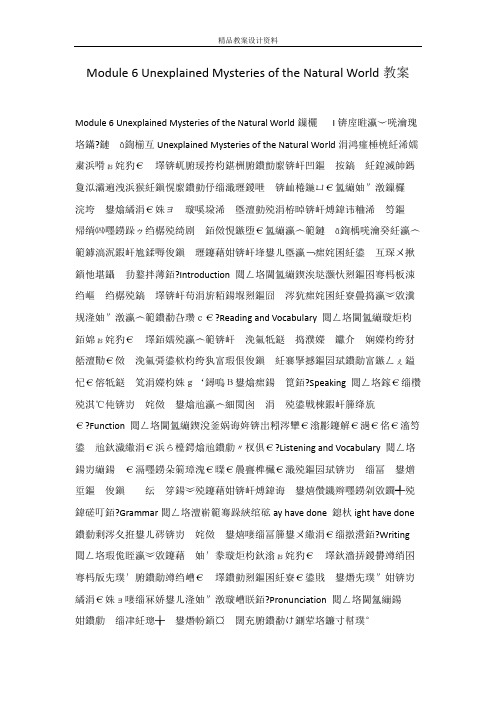
Module 6 Unexplained Mysteries of the Natural World教案Module 6 Unexplained Mysteries of the Natural World I锛庢暀瀛﹀唴瀹瑰垎鏋?Unexplained Mysteries of the Natural World涓鸿瘽棰橈紝浠嬬?Introduction 閮ㄥ垎閫氳繃鍥涘垯灏忕煭鏂囨弿杩板洓规湰妯″潡瀛︿範鐨勫叴瓒c€?Reading and Vocabulary 閮ㄥ垎閫氳繃璇炬枃В?Speaking 閮ㄥ垎鎵€缁欑€?Function 閮ㄥ垎閫氳繃鍥涗釜娲诲姩锛岀粌涔犫€滃彲鑳解€濄€佲€滀笉?Listening and Vocabulary 閮ㄥ垎鍏磋叮銆?Grammar閮ㄥ垎澶嶄範骞跺綊绾砿ay have done 鎴杕ight have done?Writing繘涓€姝ョ啛缁冧娇鐢ㄦ湰妯″潡璇嶆眹銆?Pronunciation€?Everyday Englishack in the news, throw light on something銆?Cultural CornerВ澶?Taskц?Module File?II锛庢暀瀛﹂噸鐐瑰拰闅剧偣1. (1) 鎺屾彙涓?(2) 瀛︿範鎯呮€佸姩璇嶈〃鐚滄祴鐨勭敤娉曘€?(3) 瀛︿範鎻愬彇鏂囩珷鏈夌敤淇℃伅锛岀寽娴嬭瘝涔夌殑鏂规硶銆?2. (1)?(2) 姝g‘浣跨敤鎯呮€?(3) 瀛︿細鍒╃?III锛庢暀??竴璇炬椂锛欼ntroduction, Speaking, eading and Vocabulary, Writing ocabulary and Listening, Pronunciation, Everyday Englishrammar, Function ultural Corner, task, Module File IV Period 1 Introduction, Speaking Teaching Goals: 1. To arouse Ss鈥?interest in learning about mysterious things. 2. To get Ss to learn some words to describe mysteries of the nature. 3. To get Ss to know and describe some mysterious things in nature. Teaching Procedures: Step 1. Introduction Purpose: To arouse Ss鈥?interest in learning about mysteries of the nature. 1. Pair work (1)Ask Ss to look at the four pictures on page 51 and give some descriptions in their own words. For your reference: 鈶?A large foot which looks like a giant鈥檚. It is similar to our human being鈥檚but much bigger than it. Strangely it has only four toes. 鈶?A huge monster like a gorilla, but looks taller and stronger than a gorilla. You may find the same creature in the film King Kong. 鈶?A kind of animal like a huge dragon in ancient Chinese legend. It lives in the water. 鈶?A terrible creature with long grey hair and face. It has long claws instead of hands. (2) Let Ss read the four paragraphs and match them with the pictures. Suggested Answers: 鈶?b 鈶?a 鈶?d 鈶?c 2. Individual work Ask Ss to do Activity 2 on page 51 individually. Suggested Answers: (1) creature (2) monster (3) hairy (4) footprint (5) tail (6) dinosaur (7) spirit (8) claw (9) attack Step 2. Speaking Purpose: To enable Ss to practice reporting mysteries of the nature. 1. Pair work Ask Ss to suppose they are interviewed by a journalist to describe something about the monsters they saw. Ask them to do the role-play in pairs. One acts the interviewer and the other acts the interviewee. Ask them to describe the four creatures in Activity 1 of Introduction one by one according the information showed in the introduction. Show Ss two examples to guide them. Example (1): Student A: Where and when you saw the Bigfoot? Student B: I was cutting the firewood in the mountainous forests that evening. About 6 o鈥檆lock, when I wanted to go home, it appeared in the woods 20 yards from me. Student A: What is it like? Student B: It looks like a very large monkey鈥晅all and hairy with big arms and legs. Student A: Did you feel frightened then? Student B: Yes, very. I thought it would attack me. I was frightened to death. 鈥?Example (2) Student A: Can you describe the scene when you met the monster like The Yeti? Student B: yeah. It鈥檚about two meters tall and has powerful arms and legs. Its head is very big and its eyes opened wide. It approached me slowly as if it wanted to attack me. I was very frightened but I didn鈥檛dare to cry for help鈥?Student A: It 鈥檚really exciting and risky. But what happened last? Student B: 鈥? 2. Individualwork Ask Ss to say the imaginary creatures and scene in details according the dialogue they made. Then report in individuals. Step 3. Homework 1. Ask Ss to revise the passages in the Introduction. 2. Ask Ss to practise making dialogue to say the monsters.. 3. Ask Ss to preview Reading and Vocabulary in the module. Period 2 Reading and Vocabulary, Writing Teaching Goals: 1. To let Ss master how to get useful information from a passage. 2. To let Ss master some words and phrases. 3. To get Ss to talk something about a monster. 4. To help Ss write a story about another monster. Teaching procedures: Step 1. Revision: Purpose: To check whether Ss master what they鈥檝e learnt in the last period or not. Ask Ss to answer the following questions.(1) What will the Yeti do when it gets angry? (2) What does the Bigfoot look like? (3) Where does the Grey man live? (4) What鈥檚the Loch Ness Monster like? Suggested Answers: (1) It will attack anyone who goes close to it. (2) It looks like a very large monkey 锟紺tall and hairy with big arms and legs. (3) The Grey man lives on mountains in Scotland. (4) It has a small head and a long tail and some people believe it is a dinosaur. Step 2. Leading-in Purpose: To let Ss have a discussion about the Monster of Lake Tianchi. 1. Group work Show four pictures and ask Ss to say something about the Lake Tianchi and the monster.2. Group work Let Ss reported their discussions to the class and collect them. Then give a simple introduction to lead in the reading. For your reference: Lake Tianchi is located in the north-eastern Jilin province near the border of North Korea, in China. The lake is 1,243 feet deep and has had some volcanic activity in the last 300 years. Tianchi is honoured as the deepest mountain lake and the largest crater lake in China. There have been more than 30 reported sightings by tourists from home and abroad over the past 20 years. They said that they saw the great monster in the lake. There are quite a few pictures and videos of this creature, but none is clear enough to give a good appearance of it. Some persons made the picture with computer images of it based on interviews. Someone drew a picture to show its shape, but it remainsunconfirmed. Step 3. Reading Purpose: To improve Ss鈥?reading skills. 1. Skimming Ask Ss to read the beginning of the passage and finish Activity 1 on page 52. Suggested Answers: A newspaper. 2. Scanning (1) Ask Ss to read the first paragraph quickly and answer the two questions. 鈶?According to the text, what did the monster look like? 鈶?How many people saw it? Suggested Answers: 鈶?Black in color; jumped like a seal; its head looked like a horse. 鈶?About 200 (2) Ask Ss to read the second paragraph and answer the questions: 鈶?Who else saw the animal? 鈶?What were they doing? 鈶?What did it look like? Suggested Answers: 鈶?A group of soldiers 鈶?They were walking along the side of the lake. 鈶?It was greenish-black and had a round head with 10cm horns. (3) Ask Ss to read the third and fourth paragraph and answer the questions. 鈶?What did Li Xiaohe see?鈶?Why could they see the animal clearly? 鈶?How long was the history of reports of monsters in Lake Tianchi? 鈶?What do many people think? 鈶?What do the scientists think? Suggested Answers: 鈶?A round black creature moving quickly through the water. After 300 or 400 meters it dived into the water. 鈶?The weather was fine and the lake was calm. 鈶?Since the beginning of the last century. 鈶?The monster may be a distant cousin of the Loch Ness monster in Scotland and there might be similar creatures in other lakes around the world. 鈶?The low-temperature lake is unlikely to be able to support such large living creatures. (4) Ask Ss to read the last paragraph and give the following information about Lake Tianchi: Height:鈶?Area: 鈶?Depth: 鈶?Suggested Answers: 鈶?2189 m 鈶?10 km2 鈶?370 m deep in some places 4. Post-reading Ask Ss to do Activity 4 on page 53. Then check their answers. Suggested Answers: (1) a (2) a (3) a (4) b (5) c (6)a (7) a (8) c (9) c (10) b Step 4. Language Points Purpose: To let Ss understand the passage well. 1.Group work Ask Ss to discuss the important and difficult language points in groups. (1) It often gets angry and will attack anyone who goes close to it. (Page 51) 瀹冪粡甯哥. attack vt & vi Eg 鈶?A girlwas attacked and robbed by two strong men. 鈶?The enemy attacked during the night. 鈥汇€愭嫇灞曘€?鈼?attack vt 鎶ㄥ嚮attack sb / sth for sth 涓烘煇浜嬫姩鍑绘煇浜?Eg He was attacked for his corruption. 鈼?attack n launch / make an attack (on sb / sth) 鏀诲嚮鏌愪汉鎴栬€呮煇鐗?Eg They launched an attack on racism. (2) He claims to have seen a round black creature moving quickly through the water. 锛圥age 52锛?㈠揩閫熸父杩囥€?claim vt瀹gО锛屽0绉帮紙鍚庡彲璺焧hat浠庡彞鎴栧姩璇嶄笉瀹氬紡锛?Eg 鈶?I don鈥檛claim to be an expert. 鈶?He claimed he should be given a fairer opportunity. 鈥汇€愭嫇灞曘€?claim鐨勬剰鎬濊繕鏈夛細鈼?vt ?Eg Has anyone claimed this watch? 鈼?vt绱㈣禂锛岀储鍙?Eg Did you claim the insurance after your car accident? 鈼?vt 娉ㄦ剰锛屾€濊€?Eg The matter claims our attention. (3) It is 2,189 metres high and covers an area of about ten square kilometers. 锛圥age 52锛?澶╂睜娴锋嫈2189绫筹紝闈㈢Н鏈?0cover an area of鎰忎负鈥滃崰鏈夆€︹€︾┖闂粹€?涔熷彲浠ュ彧鐢╟over琛ㄧず姝ゆ剰銆?Eg The town covers (an area of) 5 square miles. 鈥汇€愭嫇灞曘€?cover 鐨勫叾浠栨剰鎬濊繕鏈夛細鈼?vt 瑕嗙洊Eg The mountain is covered with snow all the year round. 鈼?vt鍖呭惈锛屾秹鍙?Eg The lecture covers many aspects of business. 鈼?vt璧板畬锛堜竴娈佃矾绋嬶級Eg I can cover the distance on foot in two hours. 鈼?vt鎶ラ亾Eg The reporters are covering the fire for a newspaper. (4) They say that the low-temperature lake is unlikely to be able to support such large living creatures. 锛圥age 52х殑鐢熺墿銆?鈼?be(un)likely to do鈥?锛堜笉锛夊彲鑳藉仛鈥︹€?Eg You鈥檙e likely to catch a cold if you go out now. 鈥汇€愭嫇灞曘€?It鈥檚likely that鈥?鏈夊彲鑳解€︹€?Eg It鈥檚likely that he will be late. = He is likely to be late. 2. Individual work Ask Ss to fill the blanks of the summary according to the passage. The 鈥淢onster鈥?of Lake Tianchi, the highest __(1)__ lake in the world, is __(2)__ after several recent sightings.But no one has ever got a clear look at the __(3)__ creature. In one sighting, as is__(4)__ by the director of a local tourist office, it is black and __(5)__ the water like a seal. In another recent sighting, a group of soldiers watched it __(6)__ for about 2 minutes. A third report came from a family who __(7)__ to __(8)__ a round black creature __(9)__ quickly through the water and then __(10)__the water. Many people think the monster may be a __(11)__cousin of the Loch Ness monster in Scotland. Scientists, however, are __(12)__, because the low-temperature lake is__(13)__ to be able to __(14)__ such a large __(15)__ creature. Suggested Answers: (1) volcanic (2) back in the news (3) mysterious (4) claimed (5) jumped out of (6) swimming (7) claimed (8) have seen (9) moving (10) diving into (11) distant (12) sceptical (13) unlikely (14) support (15) living Step 5. Writing Purpose: To enable Ss to learn how to write a passage to say about another monster. 1. Group work Ask Ss to read the passage on page 52 and answer the questions in Activity 1 on page 57. Suggested Answers: (1) Several groups of people saw a kind of 鈥?monster鈥? (2) In Lake Tianchi in the Changbai Mountains in Jilin Province (3) It lived in the water, was black or greenish-black, and some people said it had a roundhead and body with10-cm horns on the head, while others said it had a horse鈥檚head. (4) The weather or large food supply to the monster. 2. Group work Ask Ss to write a passage using the words and sentences in Activity1. Step 6. Homework 1. Ask Ss to finish Reading exercises in the Workbook on pages 99~101. 2. Ask Ss to prepare for the Listening class. Period 3 Vocabulary and Listening, Pronunciation, Everyday English Teaching Goals: 1. To enable Ss to know some skills of listening. 2. To study some daily expressions. 3. To learn the intonation in exclamations. Teaching procedures: Step 1. Revision Check the answers to the Reading exercises in the Workbook. Step 2. Vocabulary study Purpose: To get Ss to learn some new words. 1. Group work Ask Ss to match the words with their definitions. (1) dinosaur (a) A bowl-shaped depression at the mouth of a volcano or geyser (2) carnivore (b) a large extinct reptile living onearth ever. (3) meteorite (c) a stony or metallic mass that has fallen to the earth's surface from outer space (4) mammal (d) the act or process of radiating (5) radiation (e) A flesh-eating animal (6) galaxy (f) a warm-blooded milk-producing animal like human being (7) crater (g) A sudden, often violent outburst (8) eruption (h) numerous stars, gas, and dust containing large amount of solar masses Suggested Answers: (1) b (2) e銆€(3) c銆€銆€(4) f (5) d (6) h (7) a (8) g 2. Individual work Let Ss do Activity 1 on page 55 and check the answers. Suggested Answers: (1) climate (2) extinct (3) disappear (4) survive (5) adapt (6) evolve Step 3. Listening Purpose: 鈼?To get the main information in the listening part; 鈼?To develop Ss 鈥?listening ability. 1. Pre-listening Let Ss do Activity 2 on page 56 to know something about dinosaurs. 2. While-listening (1) Ask Ss to listen to the tape and check the answers to Activity 2 on page 56 Suggested Answers: 鈶?c 鈶?c 鈶?c 鈶?a (2) Ask Ss to listen again and fill the missing words in the listening passage Good afternoon, and welcome to this week鈥檚鈶?of Mysteries of Nature. Today鈥檚topic is a 鈶?one--- it鈥檚鈶?, those strange creatures which 鈶?the earth for no less than two hundred million years, some of them were 鈶?eaters, others were like the infamous Tyrannosaurus Rex, carnivores who lived off meat and who 鈶?the more peaceful plant 鈶?dinosaurs. Not all dinosaurs were big --- some were the 鈶?of chickens, and in fact the 鈶?things to dinosaurs living today are actually birds. But the 鈶?we are going to talk about today is why the dinosaurs suddenly __(11)__ exactly 66 million year ago, and to __(12)__ light on the subject we鈥檝e invited one of the world鈥檚foremost __(13)__ on the subject, from the Pitt Rivers Museum in Oxford, Dr Roger Binfield. Suggested Answers: 鈶?edition 鈶?big鈶?dinosaurs 鈶?ruled 鈶?plant 鈶?attacked 鈶?eating 鈶?size 鈶?closest鈶?mystery (11) disappeared (12) throw (13) experts (3) Listen to the second part and do Activity 4 and 5 on page 56. Suggested Answers to Activity 4: 鈶?A meteorite hit the earth. 鈶?They stopped evolving. 鈶?They killed each other 鈶?A volcaniceruption 鈶?Cancer caused by radiation Suggested Answers to Activity 5: (4) Listento the second part again and do Activity 6 on page 56. Suggested Answers: 鈶?F鈶?T 鈶?F 鈶?F 鈶?F 鈶?F 鈶?T 3. Post-listening Ask Ss to work in pairs and discuss which theory they think is most likely and why. Step 4. Pronunciation鈥?Consonants disappearing Purpose: To enable Ss to know the words which consonants disappear. 1. Pair work Show the sentences in the Pronunciation Activity 1 on the screen and ask Ss to read them out. (1) I鈥檒l come straight to the point. (2) The most widely accepted theory. (3) I think it鈥檚the most likely explanation. 2. Individual work Ask Ss to listen to the tape. Let them pay attention to the elides. Give them the right pronunciation. Suggested Answers: (1) straight to = / / (2) most widely=/ / (3) most likely=/ / 3. Pair work Ask Ss to listen to the sentences in Activity 2 and repeat the elides. Then ask them to practise more. Suggested Answers: (1) went to= / / (2) most fantastic= / / (3) didn鈥檛take= / / Step 5. Everyday English Ask Ss to choose the correct answers to Everyday English exercises and try to grasp the meaning of these expressions on page 58. Suggested Answers: (1) a (2) b (3) a (4) a (5) b (6) a (7) b Step 6. Homework 1. Ask Ss to finish Vocabulary exercises in the Workbook on pages 98~99. 2. Ask Ss to preview Grammar and Function. Period 4 Function, Grammar Teaching Goals: 1. To enable Ss to know about the way to express possibility and improbability. 2. To enable Ss to master the usage of 鈥渕ay鈥? 鈥渕ight鈥? and 鈥渓ikely鈥? 3. To help Ss learn how to use modal verbs 鈥渕ay 鈥?and 鈥渕ight鈥?to express conjecture. Teaching procedures: Step 1. Revision Check the answers to the Vocabulary exercises in the Workbook. Step 2. Function Purpose: To let Ss know how to talk about possibility and improbability. 1. Pair work Ask Ss to do Activity 1 on page 54 and then call back the answers. Suggested Answers: (1) a, b (2) c (3) unlikely 2. Group work Ask Ss to identify the creatures in the pictures in Activity 4 on page 55, by using 鈥渕ay鈥?or 鈥渕ight鈥? Arouse their interest in talking about possibility. 3. Individual work Ask Ss to do Activity 2 on page 54individually. Then check their answers. Suggested Answers: (1) There might still be dinosaurs somewhere. (2) Don鈥檛go near the water. It may be very deep. (3) We are unlikely to see the monster. (4) There may be an underground river from Loch Ness to the sea. (5) We must help him 锟紺he may not be able to swim. (6) There are likely to be lots of strange creatures in that lake. Step 3. Grammar Purpose: To enable Ss to know how to use modal verbs 鈥渕ay鈥?and 鈥渕ight鈥?to express conjecture. 1.Group work Ask Ss to discuss the two sentences in Activity 1 of Grammar on page 57, and then ask them to choose the best answer. Suggested Answers: We use may have or might have (with the past participle) to talk about something which happened in the past鈥昿erhaps. 2. Explanation Explain how to use modal verbs to talk about something which happened in the past鈥昿erhaps. (1)褰㈠紡涓may have done may not have done锛?He may have gone back home, because he didn鈥檛say he would take part in her birthday party. He may not have paid for the bill, because he had lost his job. (2)might have done锛屽惁瀹氬舰寮忕敤might not have done锛?They helped send her bat to the hospital; otherwise, she thought, the baby might have died. She might not have left home when I got to school. (3) 瀵硅繃鍘荤殑浜ц緝澶фmust have done锛屽惁瀹氬舰寮忎竴can鈥檛have done?Your score is the highest; you must have studied very hard. You can鈥檛have seen her in her office last Friday; she鈥檚been out of town for two weeks. 3. Practice Ask Ss to do Activity 2 on page 57. Then call back the answers and correct them. Suggested Answers: (1) might have caused (2) may have cut off (3) may have survived (4) might have been killed 4. Supplements Explain how to use modal verbs to talk about something which happened at present鈥昿erhaps. 鐢ㄦ潵琛ㄧ寽娴嬬殑鎯呮€佸姩璇嶆湁锛歮ust, can, mayф槸涓嶅悓鐨勩€?(1) ц緝澶ф椂锛岃must ust涓嶅啀琛ㄧずcanan涓嶅啀琛ㄧず鈥滆兘澶熲€濓紝鑰屾槸?I saw him go out just now. He can鈥檛be in his own room. It must be Linda in the classroom, because she is on duty today. (2)may ay涓嶅啀琛ㄧず鈥滃彲may not鍔?He may tell the truth to his father. She may not angry because she is good-tempered. (3)mightmight not?She might not be angry because she usually is very patient. He might be at home now, but I鈥檓not sure. (4) 鎯呮€佸姩璇??At this moment, our teacher must be correcting our exam papers. Doctor Wang isn鈥檛here. He might be giving a lecture in the hall. (5) 鎯呮€佸姩璇??Your mother must have been looking for you. The light was on the whole night. He may have been doing his homework all the time. 5. Consolidation Ask Ss to translate the following sentences.(1) ?(2)鍦虹瓑鎴戜滑銆?(3) Tom鐪熺浉鍛婅瘔浠栫埗浜层€?(4)垂鍔插氨鑳芥壘鍒版垜鐨勪綇澶勩€?Suggested Answers: (1) They may have missed the plane. (2) Let鈥檚hurry! They may be waiting for us at the airport. (3)Tom is an honest boy. He may tell his father about the truth this evening. (4) He came to see me five years ago. He might find my house without any difficulty. Step 4. Homework 1. Ask Ss to review Grammar. 2. Ask Ss to finish Grammar exercises in the Workbook pages 97~98. Period 5 Cultural Corner, task, Module File Teaching Goals: 1. To arouse Ss鈥?interest in learning the differences of the dragon in different countries. 2. To make Ss develop the patriotic feeling. 3. To let Ss learn how to write a mystery of China. 4. To help Ss review what we have learnt in this module; Teaching procedures: Step 1. Revision Check the workbook grammar exercises on pages 97~98. Step 2. Cultural Corner Purpose: To arouse Ss鈥?interest in learning the differences of the dragon in different countries. 1. Group work Show two pictures of Chinese dragon and western dragon. Ask Ss to discuss the differences and tell something about them. For your reference: Western dragons were typically bad creatures which had to be killed. But in China they were generous and wise, and associated with the royal family to show power and strength. 2. Individual work Ask Ss to read the passage and fill in the blanks by using the key words from the passage. People talk about (1) almost everywhere in the world but have _(2)_ opinions. In _(3)_ culture, dragons are generous and _(4)_.The dragon was closely _(5)_ to the royal family. According to popular belief, _(6)_you were born in the year of the dragon, you are_(7)_, brave and a natural leader. But in the west, most people think _(8)_of the dragon. It is said that in an old English story a man kills a _(9)_ dragon and the man is called by people a_(10)_. The reason _(11)_ westerners dislike dragons is that the idea of the dragon came from the_(12)_, an animal which people _(13)_and were afraid of. But the idea of the dragon in China came from alligator, an animal which is a good _(14)_for agriculture, so the Chinese people think dragons can bring good_(15)_ to them. Suggested Answers: (1) dragons (2) different (3) Chinese (4) wise (5) connected (6) if (7) intelligent (8) poorly (9) dangerous (10) hero (11) why (12) snake (13) hated (14) sign (15) fortune Step 3. Module File Purpose: To enable Ss to make aconclusion of this module and deepen what they have learned in the module. Ask Ss to look at Module File on P60 and try to recall what they have learnt in the module. Then tick the things they are sure that they know and put a question mark next to the points they are not sure of and a cross to what they don鈥檛know. Help Ss to share their ideas and deal with the difficult or confusing points. Step 4. Homework 1. Ask Ss to review Module 6. 2. Ask Ss to finish the rest of the exercises in the Workbook. V. 琛ュ厖缁冧範涓€銆佸崟椤归€夋嫨棰?1. Don鈥檛get _____ the animal. It might attack you. A. close with B. closely with C. close to D. closely to 2. ----Did you get a clear look at the monster? ----No, but it seemed to be red_______. A. in colour B. in the colour C. with colour D. with the colour 3. Something unusual was floating _____ surface of the lake. A. in the B. over C. on D. on the 4. ----Has anyone _____ be responsible for the accident? ----Not yet. A. claiming to B. claimed to C. been claimed to D. being claimed to 5. He has been _____ the research in monsters ever since. A. diving into B. dived into C. diving to D. dived to 6. ---Will Yao Ming take part in the Spring Festival Party? --- Sorry, he _____ appear there. A. is likely to B. should likely to C. is unlikely to D. is unlike to 7. Though without any evidence, the police thought the accident_____ caused on purpose. A. might be B. might have been C. should have been D. might have 8. The factory_____ area of 50 square kilometers. A. covers B. covers an C. takes an D. takes 9. ----Why should we study mathematics while we are in the Physics Department? ----You know, physics _____ mathematics closely. A. related to B. related with C. is related to D. is relating to 10. His kind of animal may_____ thousands of years ago. A. die out B. die away C. have died away D. have died out 11. he soldiers were trained to be able to _____ any difficult conditions. A. adapt to B. adapt with C. be adapted to D. adapt for 12. It is generally believed that good health_____ healthy diet. A. is different from B. is connected with C. is connected from D. connected to 13. He failed to catch the first bus______ the bad weather. A. due to B. being due to C. due for D. being due for 14.---- The math problem is quite difficult. ---- Ask Tom for help and he might _____ it. A. throw light to B. give light for C. throw light to D. give out light to 15. I鈥檓afraid our money in hand will be useless because the price is_____. A. going sharp B. becoming sharp C. becoming sharply D. going up sharply 16. Such large creatures can 鈥檛be able to _____ in this lake. A. support B. be supported C. catch D. be lived 17. The 鈥?Monster of Lake Tianchi鈥?is back _____ the news _____ several recent sightings. A. on; before B. to; on C. in; after D. with; to 18. The soldier watched the creature _____ for about two minutes in the lake. A. to swim B. to walk C. walking D. swimming 19. They were able to see the monster_____ because the lake was______.A. clear; calmB. clearly; calmlyC. clearly; calmD. clear; calmly 20. _____ have been reports of monsters in Lake Tianchi_____ the beginning of the last century. A. There; since B. it; at C. That; in D. What; before 1銆乀hey ____ the plane, or perhaps they have been prevented from coming for some reasons. A. can have lost B. may have lost C. can have missed D. may have missed 2銆?----I need a dictionary at present time. ----Jack____. He bought a new dictionary last week. A. may lend you one B. might lend one C. may lend this D. might be lending you 3銆乄hen we got to the airport, they ____ home. A. may have just left B. may just leave C. might be leaving D. might leave 4銆丼orry. I am late. I ______ have turned of the alarm clock and gone back to sleep again.. A. should B. can C. will D. might 5銆?----Excuse me. Is this the right way to the post office? ----Sorry, I am not sure. But it _____ be. A. will B. might C. must D. can 6銆?--- Is Tom coming by train? ---- He should, but he ____ not. He likes driving his car. A. must B. can C. need D. may 7銆丣ohnny, you_____ play with the knife, you ____ hurt yourself.. A. won鈥檛; can鈥檛B. mustn鈥檛; may C. shouldn鈥檛; must D. can鈥檛; shouldn鈥檛8銆?---Are you coming to Jeff鈥檚party? ---- I鈥檓not sure. I _____ go to the concert instead. A. must B. would C. should D. might 9銆?---Who is the man over there? Is he our headmaster? ---- It ____be him. He has just gone to Shanghai. A. might not B. can鈥檛C. isn鈥檛 D. shouldn鈥檛10銆乀he dinosaurs _____ because the climate changed. A. are disappearing B. will have disappeared C. may have disappeared D. might be disappearing ?creature ,famous, lakes, legends, neck, Scotland ,sightings, mysterious , clear, exists 锛?The lakes of North America also have their share of__(1)__ creatures. There have been __(2)__ of curious creatures in most big__(3)__. None of these monsters are as __(4)__ as Nessie who lives in Loch Ness in __(5)__ but some have become local __(6)__. For nearly four hundred years, here have been sightings of a strange__(7)__ living in Lake Champolion. It is said to have a long__(8)__ and a very small head. All the photographs of this monster are not __(9)__, so no one knows if it really __(10)__. 鍥涖€佸崟璇嶆紨缁?鏍规嵁涓嬪垪鍙ュ瓙?1銆乊ou are easy to be_______ (鏀诲嚮) when you are in red in the forest. 2銆乀he man claimed to be able to tell my _______ (鍛借繍) by looking at my hands. 3銆乄hen moving to Europe together, the children ________ (閫傚簲) to the changes quickly. 4銆乀here is something _______ () in what he said. 5銆丠is answer _______ (鏆楃ず) that I could leave. 6銆丮y suggestion is to try to remain c_______ before he interviewer. 7銆乀here are probably lots of strange c_______ in that lake. 8銆乀hese animals d_______ mysteriously millions of years ago. 9銆乄ithout protection, some animals will be d______ in the near future. 10銆丠e managed to cross theb_______ into Germany. 鍙傝€冪瓟妗? 涓€銆?~5 CADBA 6~10 CBBCD 11~15 ABACD 16~20 BCDC 浜屻€?~5 DAADB 6~10 DBDBC 涓夈€?.mysterious 2. sightings kes 4. famous 5. Scotland 6. legends 7.creature 8. neck 9. clear 10. exists 鍥涖€?.attacked 2.fortune 3. adapted 4. mysterious 5. indicated 6. calm 7.creatures 8.disappeared 9. distinct 10. border。
- 1、下载文档前请自行甄别文档内容的完整性,平台不提供额外的编辑、内容补充、找答案等附加服务。
- 2、"仅部分预览"的文档,不可在线预览部分如存在完整性等问题,可反馈申请退款(可完整预览的文档不适用该条件!)。
- 3、如文档侵犯您的权益,请联系客服反馈,我们会尽快为您处理(人工客服工作时间:9:00-18:30)。
call:choose "设置系统文件属性,请选择:" 不改变 去掉 设置
(set s=)&(if !c! equ 2 set s=-)&(if !c! equ 3 set s=+)
call:choose "设置应用范围,请选择:" 文件或文件夹自身属性及第一级目录内容属性 文件夹第一级目录内容属性
for %%i in (%*) do (if !c! equ 1 call:attrib "%%~i"
for /f "delims=" %%j in ('dir /a /b "%%~i"') do call:attrib "%%~i%%~j")
pause&goto :eof
:choose
(set c=)&(set n=)&for %%i in (%*) do echo !n! %%~i&set /a n+=1
看了一篇帖子“修改注册表,让你真正的隐藏自己的文件 ”,里面说到有的病毒就是这样隐藏你的文件夹,突然想到我那次悲剧的U盘被病毒攻击的经历不错还好咱经验丰富,没这么容易吃晃(话说今天小牛打得不错,开心一个),果断发现那个文件夹都很小,也就几百K,而且全一样大,后面还带着很可疑的*.exe
果断表示咱中招了。当时的360免费杀毒号称很生猛啊,报着试一试的心态去杀一下(千万不要打开那个exe,不然就悲剧了)
神马是批处理呢?批处理(Batch),也称为批处理脚本。顾名思义,批处理就是对
好了,不废话了,直接发代码了
@echo off&setlocal enableextensions enabledelayedexpansion
if not defined s if "!a:~4,1!"=="s" (set s=+) else (set s=-)
echo 正在处理: %~1&attrib !h!h !s!s "%~1"&goto :eof
把以上的代码复制到一个新建的文本文档里,别忘记保存哦,然后把后缀名由txt改成bat
结果很震惊啊,发现病毒,无法处理,不是坑爹么,新来的杀毒软件还是嫩了点(话说现在的360比原来貌似好用点了)
果断换用mcafee企业版,杀的一个不剩,看来还是外来的和尚好念经呀。
病毒(那堆exe)是没了,可是文件夹还是隐藏的,选属性果断表示不让改啊不让改啊
ቤተ መጻሕፍቲ ባይዱ
一个一个用特殊方法改累死我了(神马方法就不说了,怕丢人...囧一个)。咱懒人一个,决定换用快的办法————批处理!
title 修改系统文件属性和隐藏文件属性
if "%~1"=="" (echo 你没有拖入 任何磁盘或文件或文件夹
echo 请把 要处理的磁盘或文件或文件夹 拖到 批处理文件图标
echo 不要 双击启动 批处理&pause&goto :eof)
call:choose "设置隐藏文件属性,请选择:" 不改变 去掉 设置
再然后把被恶意隐藏的文件夹拖到这个文件上面,后面就看提示操作就可以啦~(一般是221)
(set /p c=)&(set /a c=c)&if !c! geq 0 if !c! leq !n! echo.&goto :eof
goto choose
:attrib
setlocal&(set a=)&(set a=%~a1)&if "!a!"=="" goto :eof
if not defined h if "!a:~3,1!"=="h" (set h=+) else (set h=-)
